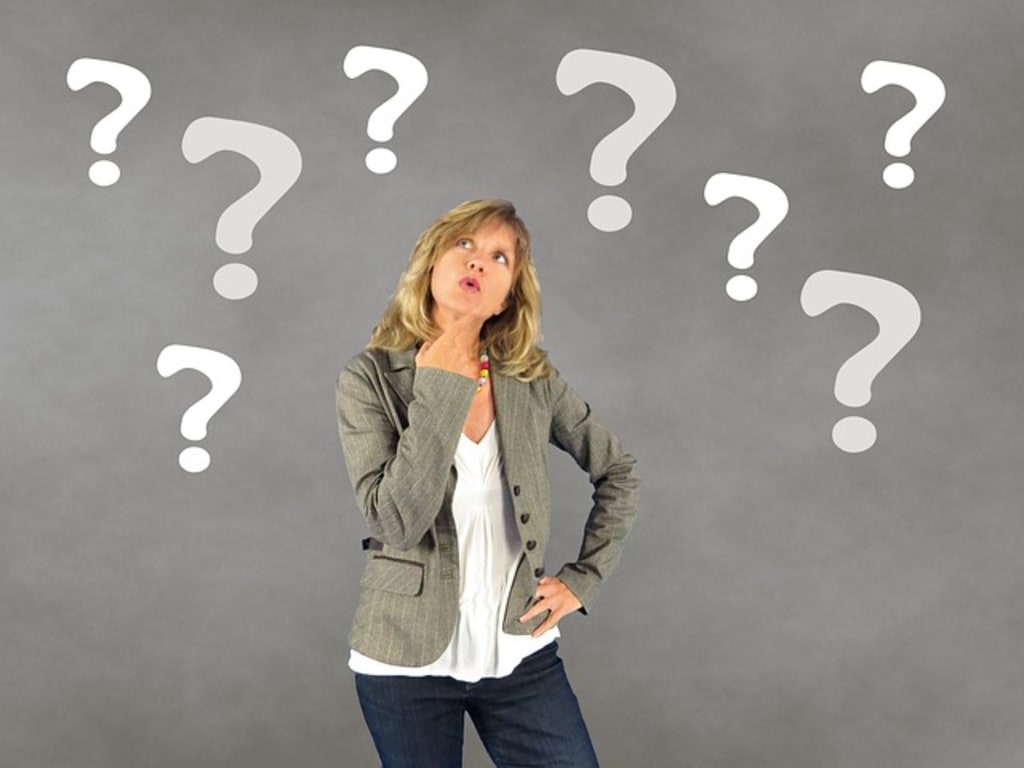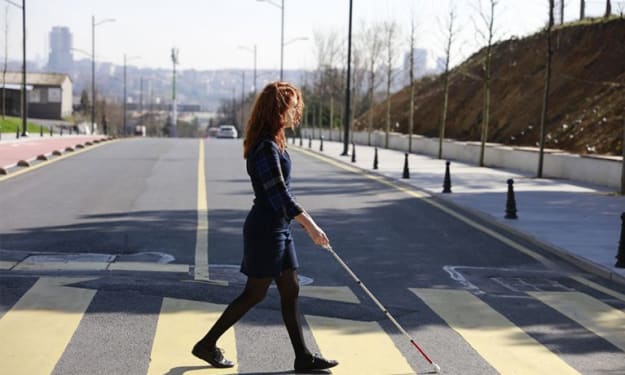My Top 10 Quora Questions on Deafness Answered
I'll share my answers and my snark

Today I was surfing through Quora, the online question and answer website. Since I'm Deaf, I decided to check out what questions people have been asking about Deafness and Deaf Culture.
Seemed innocent enough to do right?
Some people had valid questions, others had umm.... no common sense when asking their question.
I'll be providing my answers to the questions as well as my snarky comebacks. No apologies given.
Let's check out my top 10 Quora questions on Deafness:
1. Should Deaf People try to Learn Braille?
Braille is a system of raised dots that can be read with the fingers by people who are blind or who have low vision. Read that again, who are blind or have low vision.
Deafness is the total or partial inability to hear sounds. So, most of the time our eyes are fine.
So, the short answer would be no.
However, there are people who are Deafblind, due to many different causes, but a prevalent one is Usher's Syndrome, where one is usually born Deaf and loses their vision later. These people should be encouraged to learn Braille to stay connected with the world around them.
This is a huge misconception in society and sign language and braille are often "mashed together." Hence why so many Deaf people get handed Braille menus in restaurants.
2. Can People Who Always been Deaf Lip Read?
Lipreading is the ability to watch a speaker’s lips and face to figure what's being said. Lipreaders need to pick out specific speech patterns, mouth movements, and combine them with gestures and facial expressions to "understand" a conversation.
Note that I put the word understand in brackets? This is because lipreading isn't easy and the most proficient lipreaders actually can truly understand only 30 percent to 45 percent of spoken speech, if they're lucky.
That means about three out of 10 words in a sentence is understood—the rest is guesswork, all based on the subject matter, body language, facial expressions, and for a few people, residual hearing.
Your best option is to ask the Deaf or Hard of Hearing person what's their preferred method of communication. Some prefer to write notes back and forth, some rather text on their phone and pass that back and forth, still others will insist on an interpreter. Please respect their choices in communicating.
3. What are Deaf People’s Marriage Called?
My coffee isn’t strong enough to comprehend the thinking behind this question.
First off, Deaf people are just like you, me, and everyone else, the only difference is that they can’t hear, or hear well enough in some cases.
Deaf people have jobs, an education, families, interesting lives, goals, and dreams just like anyone else. Sure, we may have a different Culture that we immerse ourselves in, but all in all, nothing extraordinary about us.
So, to answer your question:
A Deaf marriage is called... marriage. Surprise, surprise.
4. Can Deaf People Write?
No, the AI in this computer is doing it all for me through telepathy.
Too often it’s assumed that because one cannot hear, they also cannot think. I promise you there is no correlation between the two at all.
Deaf people can read and write at various levels of understanding which depends on their education—just like “hearing” people, (our name for those who can hear).
There are many successful Deaf people who have PhD's, Master Degrees, and so on, as well as those that work in complex fields like Medicine, Engineering, Science, and so on.
Although there is a phenomenon where some Deaf have trouble understanding and expressing complex ideas and are socially stunted and that’s from being language deprived. Language deprivation happens when a deaf child does not receive adequate language exposure and this creates language delays as well as behavioral and social issues.
This small group will have trouble with reading, writing, and comprehension, but they still can read and write, period.
(Psst, the way to eradicate language deprivation—teach Deaf babies and children ASL to start with).
5. Why is There So Much Pushback in the Deaf Community Over Ways to Give Deaf People the Means to Hear?
Excellent question and one that I’m happy to answer.
First, I’ll quickly explain the difference between “deaf” and “Deaf”, small d and capital D.
The "deaf" usually don't associate with others in the deaf community, usually don't sign, strive to fit in more with hearing people, and identify their hearing loss in medical terms only.
The "Deaf" are part of a robust Deaf Culture and have a strong Deaf identity. They usually come from a School for the Deaf, are fluent signers, and are heavily involved with other Deaf people, clubs, and events.
The Deaf community feel they are not “broken” and don’t need to be fixed. In my opinion, as a Deaf person myself, it’s society that disables us, not our hearing loss.
Now, back to the question—there are a lot of reasons for the pushback, the main ones are:
- People inventing stuff without a majority of Deaf peoples’ input. Just because your one deaf contact thought it’s a good idea means it’ll go over well with the whole community.
- The onus is placed on the Deaf person to communicate. Think about the viral video of those (ugh) “signing gloves”—the Deaf person needs to learn the technology, carry all the equipment, and then there’s the complexity of sign language, no gloves is going to correctly capture facial expressions, body language, signing style, and all the variety of regional signs out there.
- It’s only one-way communication. How is the Deaf person going to understand you? These gadgets were made for the benefit of society, not the Deaf community.
So, please just stawwwwp with these gadgets!
6. What Should a Hearing Person Never Do or Say to a Deaf Person?
Oh my, where do I begin?
Let me just rattle off a few:
- Don't tell them “never mind” or “I’ll tell you later” when they ask what’s being said.
- Don't say “you speak so well”—well gee thanks, that’s from years and years of forced speech therapy. It just shows you’re more interested in how I talk rather than what I have to say.
- Doubt our hearing loss—just because one could “hear” one type of sound will mean they’ll hear another, then there’s variables such as background noise, speaker voice, and so on and on. Don’t test us or ask us to prove it to you.
- Doubt our abilities—again, Deaf people can do all kinds of things just like anyone else.
- Don't say “I’m sorry”—did you cause me to go Deaf? No apologies and definitely no pity needed.
- Don't say something like “My dog is deaf,” “my aunt’s hairdresser’s neighbor’s cousin is deaf”—So? What’s your point? I know there’s an instinct to want to “connect” to people but please just stop.
- Don’t start yelling louder at us—yelling just distorts the words if we’re trying to lipread and besides you’ll look stupid yelling because we’re still Deaf.
Just use a little common sense and think how would you like to be treated.
7. Blind People Have Dark Glasses and the White Cane. What Do Deaf People Wear or Do to Signal Their Impairment?
We wear earmuffs.
C’mon seriously? First off, not all blind folks wear sunglasses or use a white cane, that’s a bad portrayal set by the media. Secondly, there’s no “set” rule for identifying Deaf people.
Maybe for a few Deaf, you’ll be able to spot a hearing aid or a cochlear implant, maybe you’ll see others signing, but in general, your guess is as good as mine.
Speaking of identification—don’t tell a Deaf person that “they don’t look deaf.”
8. Is “Hearing Impaired” An Acceptable Term?
Remember I mentioned the difference between “deaf” and “Deaf”? Those who are Deaf don’t see themselves needing to be fixed, and “impaired” implies that they’re broken, so no, hearing impaired is not an acceptable term.
Instead use “Deaf” or “Hard of Hearing.”
These would be the general terms to use, but it's also up to the person’s personal preference. If one identifies as hearing impaired, then use it with that person.
While we’re on the topic of appropriate terms, I want to shout out to all the journalists and media writers out there—STOP USING CONDESCENDING DESCRIPTIONS!!
So many articles contain words like:
- Victim of [disability]
- Suffers from [disability]
- Helpless
- Brave to live with [disability]
- Overcame
- Inspirational
- Confined to [wheelchair]
- Wheelchair bound
These are all negative connotations which just enforces the stereotype that we cannot do anything.
9. Does Physical Contact Like Holding Hands Enhance a Deaf Person’s Hearing Capability?
What? What does that even mean!!??
Let me think about this for a bit, I’m still dazed.
Well, if two Deaf people are trying to sign and they’re holding hands, won’t that impede their conversation instead of enhance it?
Okay, seriously, if a Deaf person touches something—say a table, an audio speaker, or other item that’s vibrating with the sound, they may feel the sound better. There’s even a company called NeoSensory that makes wearable technology to hear music.
But, holding hands to enhance hearing? Nope.
10. What are the Perks of Being Deaf?
I saved the best and most positive question for last!
Many people concentrate on the can’t part and loose perspective of what we call “Deaf Gain,” the awesomeness of being Deaf.
Let me list a few generic ones:
- Deaf can sleep through loud noise (like the neighbors mowing at 6 AM).
- Deaf are more visual, they can catch more going on around them (Deaf people have been proven to be better drivers).
- Deaf with residual hearing can “switch off” their hearing aids in noisy situations.
- We can talk with our mouth full, talk through windows, talk to another across a room, chat in noisy areas. (All with sign language).
- Better at communicating—we can gesture, read and use facial expressions and body language to convey and understand a message. Nyle DiMarco’s travel story proves this point.
- Be part of a rich, diverse culture of its own unique art, history, poetry, writing, language and awesome people!
Deafness isn’t something to be pitied or looked down upon, not to be anyone’s inspiration, or to be scared of.
Just use a little common sense and give us more credit than you believe.
About the Creator
Tracy Stine
Freelance Writer. ASL Teacher. Disability Advocate. Deafblind. Snarky.






Comments
There are no comments for this story
Be the first to respond and start the conversation.